Una delle nostre principali raccomandazioni per gli utenti di WordPress è imparare a gestire i propri database di WordPress.
WordPress è scritto utilizzando PHP come linguaggio di scripting e MySQL come sistema di gestione del database. Per utilizzare WordPress, non è necessario imparare nessuno dei due.
Tuttavia, una comprensione molto basilare dei due potrebbe aiutarti a risolvere i problemi e ad aumentare la tua conoscenza di come funziona WordPress (dietro le quinte).
In questo articolo, spiegheremo come WordPress utilizza il database, inclusa un'introduzione alle tabelle di database predefinite di WordPress. Ti mostreremo anche come gestire un database di WordPress utilizzando phpMyAdmin, inclusa la creazione di backup del database, l'ottimizzazione del database di WordPress, la riparazione del database di WordPress e altro ancora.
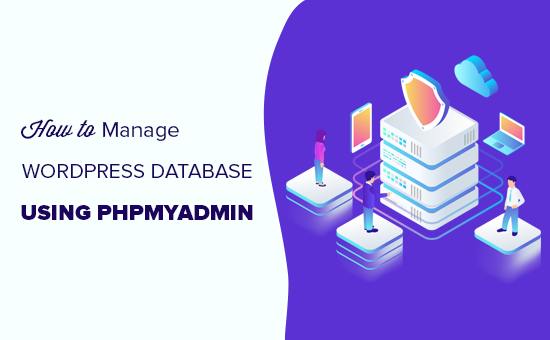
Questa è una guida completa sulla gestione del database di WordPress, quindi abbiamo aggiunto un indice per una navigazione più semplice:
- Cos'è un database e come lo utilizza WordPress?
- Cos'è phpMyAdmin?
- Come accedere a phpMyAdmin
- Comprensione delle tabelle di database di WordPress
- Gestione del database di WordPress tramite phpMyAdmin
- Creazione di un backup del database di WordPress tramite phpMyAdmin
- Creazione di un backup di WordPress utilizzando un plugin
- Importazione di un backup del database di WordPress tramite phpMyAdmin
- Ottimizzazione del tuo database di WordPress in phpMyAdmin
- Risoluzione dei problemi di WordPress tramite phpMyAdmin
- Reimposta la password di WordPress usando phpMyAdmin
- Aggiungere un nuovo utente amministratore a WordPress usando phpMyAdmin
- Cambiare un nome utente di WordPress tramite phpMyAdmin
- Altri utili trucchi di phpMyAdmin
- Proteggere il tuo database WordPress
Cos'è un database e come lo utilizza WordPress?
Un database è un sistema per organizzare e recuperare dati. Permette al software di gestire i dati in modo programmabile.
Ad esempio, WordPress utilizza PHP (un linguaggio di programmazione) per memorizzare e recuperare dati dal database.
Le informazioni memorizzate in un database WordPress includono post, pagine, commenti, categorie, tag, campi personalizzati, utenti e altre impostazioni di WordPress. Approfondiremo questo aspetto più avanti nel tutorial quando parleremo delle tabelle del database di WordPress.
Quando installi WordPress per la prima volta, ti chiede di fornire un nome del database, un host, un nome utente e una password. Queste informazioni sono memorizzate nel file di configurazione, chiamato wp-config.php.
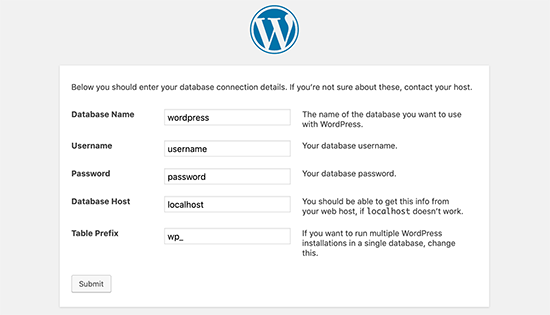
Durante l'installazione, WordPress utilizza le informazioni che fornisci sul database per creare tabelle e memorizzare i dati di installazione predefiniti all'interno di tali tabelle.
Dopo l'installazione, WordPress esegue query su questo database per generare dinamicamente pagine HTML per il tuo sito web o blog.
Questo rende WordPress estremamente potente perché non devi creare un nuovo file .html per ogni pagina che desideri creare. WordPress gestisce tutto dinamicamente.
Dove è memorizzato il mio database WordPress?
WordPress utilizza MySQL come sistema di gestione del database, che è un software installato sul tuo server di hosting WordPress. Anche il tuo database WordPress è memorizzato sullo stesso server.
Questa posizione non è accessibile sulla maggior parte degli ambienti di hosting condiviso. Tuttavia, se ti trovi su un piano di hosting VPS o su un server dedicato, puoi utilizzare gli strumenti da riga di comando per individuare il database.
Nella maggior parte dei casi, si trova nel seguente percorso:
/var/lib/mysql/nome_del_tuo_database
Tuttavia, questo potrebbe variare da un provider di hosting all'altro.
È importante tenere presente che non è necessario accedere al file del database stesso. Puoi utilizzare altri strumenti come phpMyAdmin per gestire il tuo database.
Cos'è phpMyAdmin?
phpMyAdmin è un software basato sul web che ti consente di gestire database MySQL utilizzando il tuo browser web. Offre un'interfaccia facile da usare che ti permette di eseguire comandi MySQL e operazioni sul database.
Puoi anche usarlo per sfogliare e modificare tabelle, righe e campi del database. Ti consente inoltre di importare, esportare o eliminare tutti i dati all'interno di un database.
Come accedere a phpMyAdmin
PhpMyAdmin viene preinstallato con tutte le principali società di hosting WordPress. Puoi trovarlo nella sezione Database del pannello di controllo cPanel del tuo account di hosting. Di seguito è riportato uno screenshot di esempio dal pannello di controllo di Bluehost:
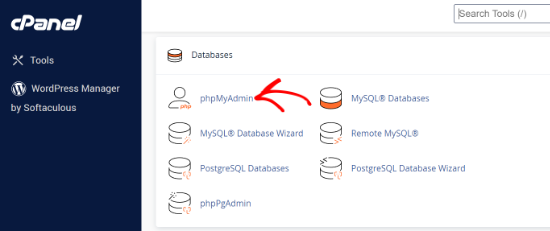
A seconda del tuo provider di hosting, la tua interfaccia cPanel potrebbe apparire diversa dallo screenshot sopra. Tuttavia, puoi comunque trovare l'icona di phpMyAdmin nella sezione Database.
Facendo clic su di essa si aprirà l'interfaccia di phpMyAdmin, dove potrai selezionare il tuo database WordPress dalla colonna di sinistra. Successivamente, phpMyAdmin visualizzerà tutte le tabelle nel tuo database WordPress.
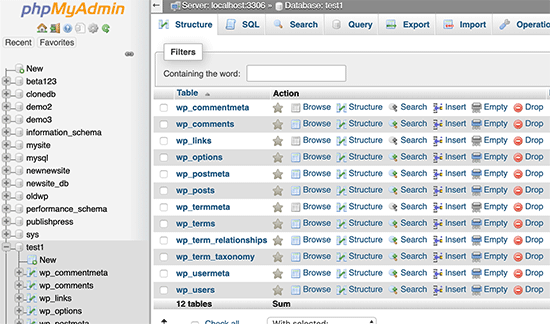
Diamo un'occhiata alle tabelle del database di WordPress.
Comprensione delle tabelle di database di WordPress
Ogni installazione di WordPress ha 12 tabelle predefinite nel database. Ogni tabella del database contiene dati per diverse sezioni, funzionalità e funzionalità di WordPress.
Osservando la struttura di queste tabelle, puoi facilmente capire dove sono archiviate le diverse parti del tuo sito web. Attualmente, un'installazione predefinita di WordPress crea le seguenti tabelle:
Nota: Il prefisso wp_ è presente prima di ogni nome di tabella nel database per impostazione predefinita, ma puoi cambiarlo durante l'installazione.
- wp_commentmeta : Questa tabella contiene metadati sui commenti pubblicati su un sito WordPress. La tabella ha quattro campi: meta_id, comment_id, meta_key e meta_value. Ogni meta_id è correlato a un comment_id. Un esempio di metadati di commenti memorizzati è lo stato di un commento (approvato, in attesa, cestino).
- wp_comments : Come suggerisce il nome, questa tabella contiene i tuoi commenti WordPress. Contiene il nome dell'autore del commento, l'URL, l'email, il commento e altro ancora.
- wp_links : Per gestire i blogroll creati dalle versioni precedenti di WordPress o dal plugin Link Manager.
- wp_options : Questa tabella contiene la maggior parte delle impostazioni globali del tuo sito WordPress, come l'URL del sito, l'email dell'amministratore, la categoria predefinita, i post per pagina, il formato dell'ora e molto altro. La tabella delle opzioni viene utilizzata anche da numerosi plugin WordPress per memorizzare le impostazioni dei plugin.
- wp_postmeta : Questa tabella contiene metadati sui tuoi post, pagine e tipi di post personalizzati di WordPress. Esempi di metadati dei post includono il template utilizzato per visualizzare una pagina, i campi personalizzati, ecc. Alcuni plugin utilizzano anche questa tabella per memorizzare dati dei plugin, come le informazioni SEO di WordPress.
- wp_posts : Il nome dice post, ma in realtà questa tabella contiene tutti i tipi di post o, dovremmo dire, tipi di contenuto. Questa tabella contiene tutti i tuoi post, pagine, revisioni e tipi di post personalizzati.
- wp_termmeta : Questa tabella consente agli sviluppatori di memorizzare metadati personalizzati per i termini nelle loro tassonomie personalizzate. Ad esempio, WooCommerce la utilizza per memorizzare metadati per attributi e categorie di prodotti.
- wp_terms : WordPress ha un potente sistema di tassonomie che ti consente di organizzare i tuoi contenuti. I singoli elementi di tassonomia sono chiamati termini e sono memorizzati in questa tabella. Ad esempio, le tue categorie e tag di WordPress sono tassonomie, e ogni categoria/tag al loro interno è un termine.
- wp_term_relationships : Questa tabella gestisce la relazione dei tipi di post di WordPress con i termini nella tabella wp_terms. Ad esempio, questa è la tabella che aiuta WordPress a determinare se il post X si trova nella categoria Y.
- wp_term_taxonomy : Questa tabella definisce le tassonomie per i termini definiti nella tabella wp_terms. Ad esempio, se hai il termine “Tutorial di WordPress“, allora questa tabella contiene i dati che dicono che è associato a una tassonomia chiamata categoria. In breve, questa tabella contiene i dati che aiutano WordPress a distinguere quale termine è una categoria, quale è un tag, e altro ancora.
- wp_usermeta : Contiene informazioni meta sui utenti registrati sul tuo sito web.
- wp_users : Contiene informazioni sull'utente come nome utente, password, email dell'utente e altro ancora.
Gestione del database di WordPress tramite phpMyAdmin
Il tuo database WordPress contiene importanti impostazioni di WordPress, così come tutti i tuoi post del blog, pagine, commenti e altro ancora. Devi essere estremamente cauto quando usi phpMyAdmin, altrimenti potresti finire per cancellare accidentalmente dati importanti.
Come precauzione, dovresti sempre creare un backup completo del database. Questo ti permetterà di ripristinare il tuo database al suo stato precedente.
Diamo un'occhiata a come creare facilmente un backup del database di WordPress.
Creazione di un backup del database di WordPress tramite phpMyAdmin
Per creare un backup del tuo database WordPress da phpMyAdmin, fai clic sul database. Quindi, nel menu in alto, fai semplicemente clic sulla scheda 'Esporta'.
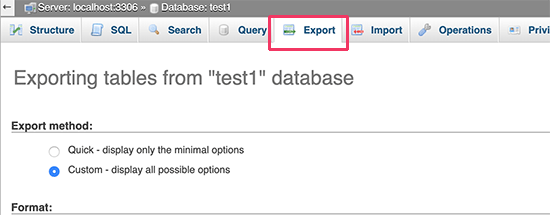
Nelle versioni più recenti di phpMyAdmin, ti verrà chiesto un metodo di esportazione. Il metodo rapido esporta il tuo database in un file .sql. Nel metodo personalizzato, ti verranno fornite più opzioni e la possibilità di scaricare i backup in formati di archivio zip o gzip compressi.
Si consiglia di utilizzare il metodo personalizzato e di scegliere zip come metodo di compressione. Il metodo personalizzato ti consente anche di escludere tabelle dal database.
Supponiamo che tu abbia utilizzato un plugin che ha creato una tabella di database e non stai più utilizzando quel plugin. In tal caso, puoi scegliere di escludere quella tabella dal backup.
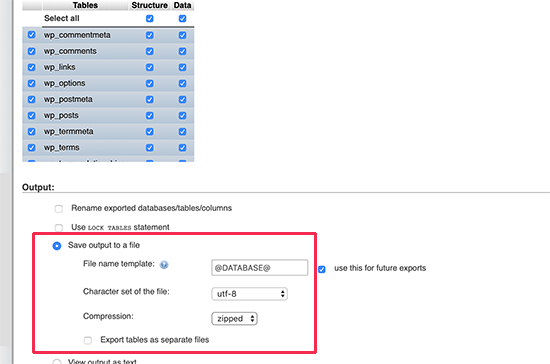
Il tuo file di database esportato può essere importato nuovamente in un database diverso o nello stesso database utilizzando la scheda Importa di phpMyAdmin.
Creazione di un backup di WordPress utilizzando un plugin
Mantenere backup regolari del tuo sito WordPress è la cosa migliore che puoi fare per la sicurezza di WordPress. Sebbene il database di WordPress contenga la maggior parte delle informazioni del tuo sito, mancano ancora diversi elementi abbastanza importanti, come file di template, immagini, caricamenti, ecc.
Tutte le tue immagini sono archiviate nella cartella uploads nella directory /wp-content/. Anche se il database ha le informazioni su quale immagine è collegata a un post, è inutile se la cartella delle immagini non contiene quei file.
Spesso, i principianti pensano che un backup del database sia tutto ciò di cui hanno bisogno. Questo NON è vero. Devi avere un backup completo del sito che includa temi, plugin e immagini.
Sebbene la maggior parte delle società di hosting affermi di effettuare backup giornalieri, ti consigliamo di conservare i backup da solo, per ogni evenienza.
Nota: Se stai utilizzando una soluzione di hosting WordPress gestito come WP Engine, allora loro creano backup giornalieri.
Per la maggior parte delle persone che non utilizzano WP Engine, dovresti utilizzare un plugin di backup per WordPress per impostare backup automatici di WordPress sul tuo sito.
Importazione di un backup del database di WordPress tramite phpMyAdmin
phpMyAdmin ti consente inoltre di importare facilmente il tuo database WordPress. Avvia semplicemente phpMyAdmin e quindi seleziona il tuo database WordPress.
Successivamente, devi fare clic sul link 'Importa' nel menu in alto.
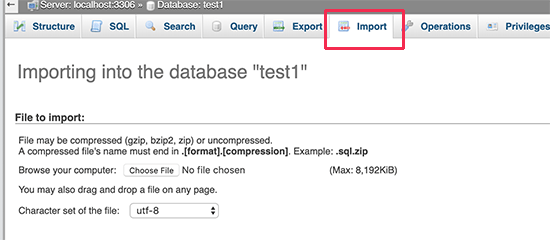
Nella schermata successiva, fai clic sul pulsante 'Scegli file' e quindi seleziona il file di backup del database che hai scaricato in precedenza.
phpMyAdmin elaborerà ora il caricamento del tuo file di backup e lo importerà nel tuo database WordPress. Una volta terminato, vedrai un messaggio di successo.
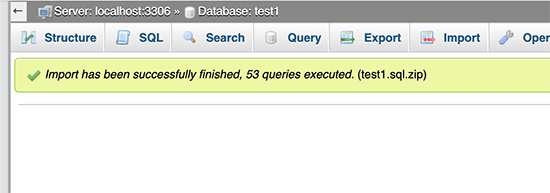
Ottimizzazione del tuo database di WordPress in phpMyAdmin
Dopo aver utilizzato WordPress per un po', il tuo database diventa frammentato. Ci sono overhead di memoria che aumentano le dimensioni complessive del tuo database e il tempo di esecuzione delle query.
MySQL include un semplice comando che ti permette di ottimizzare il tuo database. Vai semplicemente su phpMyAdmin e fai clic sul tuo database WordPress. Questo ti mostrerà un elenco delle tue tabelle WordPress.
Fai clic sul link 'Seleziona tutto' sotto le tabelle. Accanto ad esso, c'è un menu a discesa "Con selezionati". Devi fare clic su di esso e scegliere 'Ottimizza tabella'.
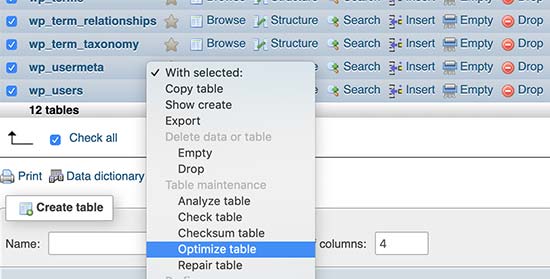
Questo ottimizzerà il tuo database WordPress deframmentando le tabelle selezionate. Renderà le tue query WordPress un po' più veloci e ridurrà leggermente le dimensioni del tuo database.
Risoluzione dei problemi di WordPress tramite phpMyAdmin
Come abbiamo menzionato in precedenza, phpMyAdmin è uno strumento utile per la risoluzione dei problemi e la correzione di alcuni errori comuni di WordPress e problemi.
Vediamo alcuni problemi comuni di WordPress che possono essere facilmente risolti utilizzando phpMyAdmin.
Reimposta la password di WordPress usando phpMyAdmin
Se hai dimenticato la password di amministratore di WordPress e non riesci a recuperarla tramite un'email di password persa, allora questo metodo ti permette di reimpostarla rapidamente.
Per prima cosa, avvia phpMyAdmin e seleziona il tuo database WordPress. Questo visualizzerà le tabelle del tuo database WordPress dove devi fare clic su 'Sfoglia' accanto alla tabella wp_users.
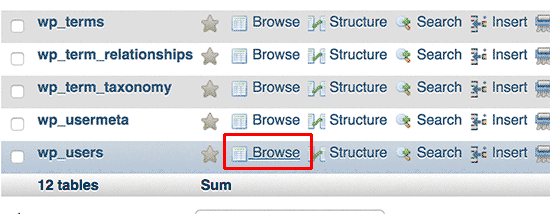
Nota: Le tabelle nel tuo database WordPress potrebbero avere un prefisso di tabella diverso da quello che stiamo mostrando nel nostro screenshot.
Ora vedrai le righe nella tua tabella utenti di WordPress. Fai clic sul pulsante 'Modifica' accanto al nome utente per il quale desideri cambiare la password.
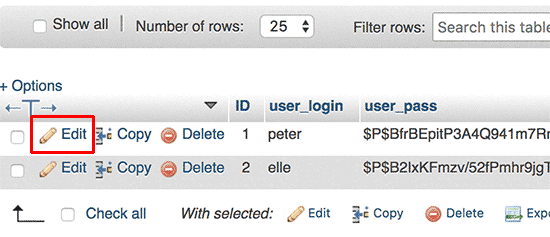
phpMyAdmin ti mostrerà un modulo con tutti i campi delle informazioni utente.
Dovrai eliminare il valore nel campo ‘user_pass’ e sostituirlo con la tua nuova password. Nella colonna ‘Function’, seleziona ‘MD5’ dal menu a discesa e fai clic sul pulsante ‘Go’.
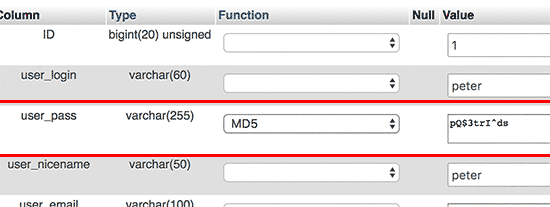
La tua password verrà crittografata utilizzando l'hash MD5 e quindi memorizzata nel database.
Congratulazioni! Hai cambiato con successo la tua password di WordPress utilizzando phpMyAdmin.
Ora, alcuni di voi potrebbero chiedersi perché abbiamo selezionato l'hash MD5 per crittografare la password.
Nella versione precedente, WordPress utilizzava l'hash MD5 per crittografare le password. Dalla versione 2.5, ha iniziato a utilizzare tecnologie di crittografia più robuste. Tuttavia, WordPress riconosce ancora MD5 per fornire compatibilità retroattiva.
Non appena accedi utilizzando una stringa di password memorizzata come hash MD5, WordPress la riconosce e la modifica utilizzando gli algoritmi di crittografia più recenti.
Aggiungere un nuovo utente amministratore a WordPress usando phpMyAdmin
Supponiamo che tu abbia accesso al database di WordPress ma non all'area di amministrazione di WordPress. Sebbene tu possa cambiare la password dell'utente amministratore, ciò impedirà ad altri utenti amministratori di utilizzare i propri account.
Una soluzione più semplice sarebbe aggiungere un nuovo utente amministratore tramite phpMyAdmin.
Innanzitutto, devi avviare phpMyAdmin e quindi selezionare il tuo database WordPress. Questo mostrerà le tabelle del tuo database WordPress, dove dovrai fare clic sul link ‘Browse’ accanto alla tabella wp_users.

phpMyAdmin ti mostrerà ora le righe all'interno della tabella wp_users.
Fai clic sul link ‘Insert’ dal menu in alto.
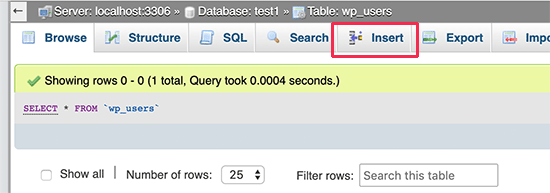
Questo aprirà un modulo che dovrai compilare per aggiungere un nuovo utente al tuo sito WordPress.
Ecco come devi compilare ogni campo in questo modulo.
- ID – Puoi ignorare questo, poiché viene generato automaticamente.
- user_login – Questo sarà il nome utente di WordPress che utilizzerai per accedere.
- user_pass – Questa è la tua password di WordPress. Devi inserire la password e selezionare MD5 nella colonna della funzione.
- user_nicename – Questo è il nome utente compatibile con gli URL che puoi utilizzare per accedere.
- user_email – Inserisci un indirizzo email valido, poiché potrebbe esserti necessario per ricevere email di reimpostazione della password e notifiche di WordPress.
- user_url – Aggiungi l'URL del tuo sito web, oppure puoi lasciarlo vuoto.
- user_registered – Devi selezionare CURRENT_TIME nella colonna della funzione per inserire automaticamente l'ora corrente qui.
- user_activation_key – Puoi anche lasciare vuoto questo campo, viene utilizzato per approvare la registrazione dell'utente.
- user_status – Puoi anche lasciare vuoto questo campo.
- display_name – Puoi inserire il nome completo dell'utente come desideri che venga visualizzato negli articoli. Puoi anche lasciarlo vuoto.
Dopo aver compilato il modulo, fai clic sul pulsante 'Vai' per inserirlo nel tuo database WordPress.
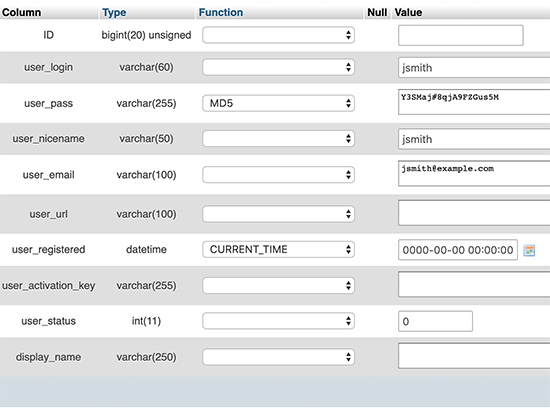
phpMyAdmin eseguirà ora la query MySQL per inserire i dati.
Abbiamo aggiunto l'utente, ma quell'utente non ha un ruolo di amministratore sul tuo sito WordPress. Questo valore viene salvato in un'altra tabella chiamata wp_usermeta.
Prima di poter rendere questo utente un amministratore, dovremo trovare l'ID utente.
Fai semplicemente clic sul link 'Sfoglia' accanto alla tabella wp_users e vedrai una riga contenente il tuo utente appena aggiunto con il suo ID utente.
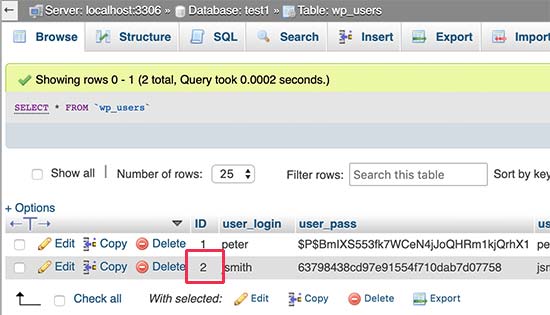
Annota l'ID utente perché ti servirà nel passaggio successivo.
Ora, apriamo la tabella wp_usermeta facendo clic sul link 'Sfoglia' accanto ad essa.

Successivamente, devi fare clic sul link 'Inserisci' in alto.
Questo ti permetterà di aggiungere una nuova riga alla tabella.

Ora vedrai un modulo per inserire una nuova riga.
Qui è dove dirai a WordPress che l'utente che hai creato in precedenza ha il ruolo di amministratore.
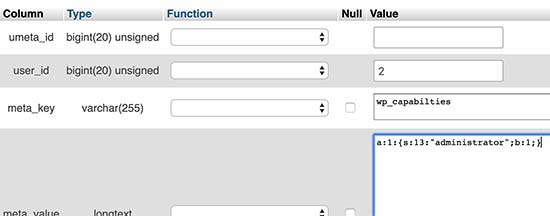
Ecco come compilerai questo modulo.
- umeta_id – Devi lasciarlo vuoto, poiché viene compilato automaticamente.
- user_id – Inserisci l'ID utente che hai copiato in precedenza.
- meta_key – Devi inserire 'wp_capabilities' in questo campo. Tuttavia, potrebbe essere necessario sostituire wp_ se i nomi delle tue tabelle WordPress utilizzano un prefisso diverso.
- meta_value – Devi inserire il seguente valore serializzato:
a:1:{s:13:”administrator”;s:1:”1″;}
Infine, fai clic sul pulsante 'Vai' per salvare le modifiche.
Successivamente, dobbiamo aggiungere un'altra riga per definire il livello dell'utente. Fai clic sul link 'Inserisci' nel menu in alto per aggiungere un'altra riga alla tabella usermeta.
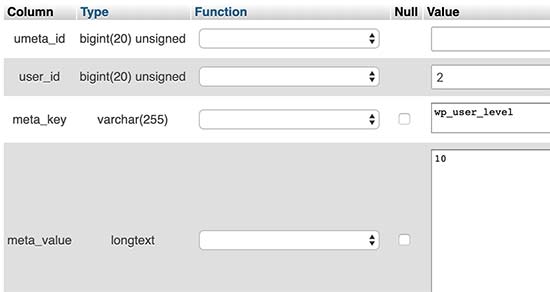
Ecco come compilerai questo modulo.
- umeta_id – Devi lasciarlo vuoto, poiché viene compilato automaticamente.
- user_id – Inserisci l'ID utente per il tuo utente appena aggiunto.
- meta_key – Devi inserire ‘wp_user_level’ in questo campo. Tuttavia, potresti dover sostituire wp_ se i nomi delle tabelle di WordPress utilizzano un prefisso diverso.
- meta_value – Qui, devi inserire ’10’ come valore del livello utente.
Non dimenticare di fare clic sul pulsante ‘Go’ per inserire i dati.
Tutto qui, ora puoi visitare l'area di amministrazione di WordPress ed effettuare l'accesso con il tuo utente amministratore appena aggiunto.
Cambiare un nome utente di WordPress tramite phpMyAdmin
Potresti aver notato che mentre WordPress ti consente di cambiare il nome completo o il nickname di un utente, non ti permette di cambiare il nome utente.
Molti utenti finiscono per scegliere nomi utente durante l'installazione che potrebbero voler cambiare in seguito. Ecco come puoi farlo tramite phpMyAdmin.
Nota: Esiste un modo più semplice per cambiare il tuo nome utente WordPress utilizzando un plugin.
Innanzitutto, devi avviare phpMyAdmin dalla dashboard del pannello di controllo del tuo account di hosting. Dopodiché, devi selezionare il tuo database WordPress.
phpMyAdmin mostrerà le tabelle del tuo database WordPress. Devi fare clic sul link ‘Browse’ accanto alla tabella wp_users.

Questa tabella elencherà ora tutti gli utenti registrati sul tuo sito web.
Successivamente, fai clic sul collegamento ‘Modifica’ accanto al nome utente che desideri modificare.
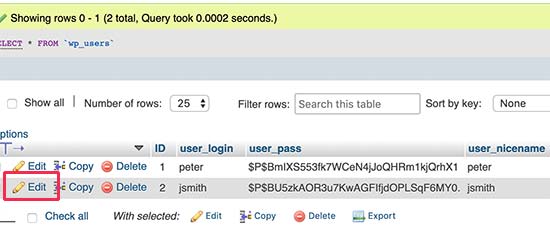
phpMyAdmin ti mostrerà ora i dati dell'utente.
Devi individuare il campo user_login e modificare il valore con il nome utente che desideri utilizzare.
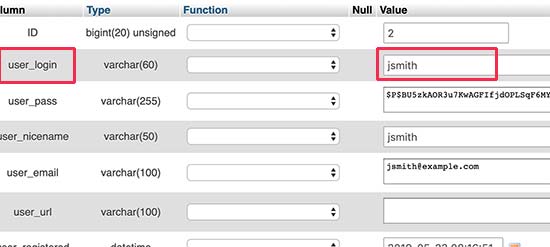
Non dimenticare di fare clic sul pulsante ‘Vai’ per salvare le modifiche. Ora puoi visitare il tuo sito web ed effettuare l'accesso con il tuo nuovo nome utente.
Altri utili trucchi di phpMyAdmin
Il tuo database WordPress è il motore del tuo sito web. Con phpMyAdmin, puoi modificare le impostazioni per migliorare le prestazioni, risolvere problemi o semplicemente cambiare cose che non possono essere modificate dall'area di amministrazione di WordPress.
Ecco alcuni altri trucchi che puoi usare con phpMyAdmin:
- Disattiva tutti i plugin di WordPress.
- Cambia il tuo tema WordPress tramite phpMyAdmin.
- Duplica il database di WordPress tramite phpMyAdmin.
- Trova e sostituisci testo nel database di WordPress
Proteggere il tuo database WordPress
Prima di iniziare, vogliamo sottolineare che ogni sito può essere hackerato. Tuttavia, ci sono alcune misure che puoi adottare per renderlo un po' più difficile.
La prima cosa che puoi fare è cambiare il prefisso del database di WordPress. Questo può ridurre significativamente le possibilità di attacchi di SQL injection sul tuo database WordPress. Questo perché gli hacker spesso prendono di mira i siti che utilizzano il prefisso della tabella wp_ predefinito.
Per istruzioni dettagliate, consulta il nostro tutorial su come cambiare il prefisso del database di WordPress.
Inoltre, dovresti sempre scegliere un nome utente e una password robusti per il tuo utente MySQL. Questo renderà difficile per qualcuno accedere al tuo database WordPress.
Per la sicurezza di WordPress, ti consigliamo vivamente di utilizzare Sucuri. È il miglior plugin di sicurezza per WordPress che intercetterà qualsiasi tentativo di iniezione MySQL prima ancora che raggiunga il tuo sito web.
Speriamo che questa guida ti abbia aiutato a imparare la gestione del database di WordPress e come utilizzare phpMyAdmin. Potresti anche voler leggere la nostra guida su come riparare un database WordPress e come aggiungere un file manager simile a FTP nella dashboard di WordPress.
Se ti è piaciuto questo articolo, iscriviti al nostro canale YouTube per tutorial video su WordPress. Puoi anche trovarci su Twitter e Facebook.





Kelsei
Sono nuovo in un lavoro e sto appena prendendo in carico il sito web. Tuttavia, sto riscontrando l'errore "Errore di connessione al database" sul sito web stesso e sulla pagina di accesso. L'email che hanno utilizzato per iscriversi originariamente al sito web è stata disattivata perché non lavora più qui. Ho cercato nei file e non riesco a trovare i file WP che vedo menzionati sopra. Non sono sicuro quali siano i miei prossimi passi. Qualche idea?
Supporto WPBeginner
Per l'errore di connessione al database, ti consigliamo di consultare il nostro articolo qui: https://www.wpbeginner.com/wp-tutorials/how-to-fix-the-error-establishing-a-database-connection-in-wordpress/
Se contatti il tuo provider di hosting, dovrebbero essere in grado di assisterti nella sostituzione dell'indirizzo email con il tuo nuovo indirizzo.
Amministratore
Sharwari
Ciao, il mio database è creato automaticamente! Posso rinominare il database?
Supporto WPBeginner
Sì, puoi, ti consigliamo di seguire la nostra guida su come farlo qui: https://www.wpbeginner.com/wp-tutorials/how-to-change-the-wordpress-database-prefix-to-improve-security/
Amministratore
Yinka
Ciao,
Ho recentemente spostato il mio hosting e ciò ha influito sul frontend del mio sito web che visualizza "Errore di connessione al database". Quindi ho creato un database.
I contenuti del sito web sono nella cartella public_html nel mio File Manager di cPanel.
Come e dove devo spostare questi contenuti nel database per visualizzare il mio sito web effettivo?
Grazie.
Supporto WPBeginner
Invece di spostare i tuoi contenuti, dovresti dare un'occhiata alla soluzione dell'errore nel nostro articolo qui: https://www.wpbeginner.com/wp-tutorials/how-to-fix-the-error-establishing-a-database-connection-in-wordpress/
Amministratore
Kerrie Taylor
Ciao, non riesco a far resettare la mia password da WordPress. Come potrei fare usando questo metodo?
Grazie
Supporto WPBeginner
Dovresti accedere al tuo provider di hosting per trovare il tuo phpMyAdmin, a seconda dell'host ci sono alcuni posti in cui potrebbe trovarsi.
Amministratore
Miza
Ciao, ho bisogno di aiuto su questo.
Sto pianificando di utilizzare il database per creare un sistema a cui possano accedere solo lo staff della nostra azienda in WordPress.
Posso sapere da dove dovrei iniziare?
Supporto WPBeginner
Se desideri creare una intranet, potresti dare un'occhiata a: https://www.wpbeginner.com/wp-tutorials/how-to-create-a-wordpress-intranet-for-your-organization/
Amministratore
Miza
E per WordPress esistente? voglio solo implementare un sistema che possa essere utilizzato solo dal nostro staff. intendo creare una pagina (fondamentalmente un report di servizio nel sito web della nostra azienda – WordPress) a cui possa accedere solo il nostro staff
Supporto WPBeginner
Se si tratta di una sola pagina, potresti usare il metodo in: https://www.wpbeginner.com/plugins/how-to-share-private-posts-with-user-groups-in-wordpress/
Mich
Ciao,
Ho recentemente creato alcuni siti Wordpress e l'ho fatto tramite l'installazione di Wordpress in un clic in cPanel. Quello che volevo sapere è: "Dovrei cambiare il nome del mio database Wordpress e il nome utente del database?" È qualcosa di facilmente hackerabile se sto già usando un plugin di sicurezza gratuito come Wordfence?
Grazie!
Supporto WPBeginner
La maggior parte delle installazioni in un clic dei provider di hosting cambiano il prefisso del database per aiutarti in questo. Non è qualcosa che per impostazione predefinita è facilmente hackerabile e i plugin di sicurezza aiutano ancora di più
Amministratore
Joachim
Questo è fantastico. Ma se creo un sito personalizzato su WordPress e inserisco un campo di validazione del modulo. I dati verranno automaticamente memorizzati nel wp_database?
Supporto WPBeginner
Dovresti impostare nel tuo modulo per memorizzare le informazioni, non sarebbe automatico.
Amministratore
John Certalic
È possibile ricevere queste informazioni via email anziché via tweet? Sarebbe più facilmente accessibile per me via email per riferimento futuro. Apprezzo tutto quello che fai per i principianti come me. Grazie.
Supporto WPBeginner
Anche se non abbiamo l'intero articolo nelle nostre newsletter via email, saremo sicuri di esaminare le possibilità.
Amministratore
polo
Salve Signore, ho ospitato il mio sito web con qualcuno che non mi ha fornito le funzionalità integrate di myphp admin. Quindi, come posso scaricarlo sul mio desktop, per favore guidami. È necessario un altro software oltre a myphp per scaricarlo?
Supporto WPBeginner
Ciao Polo,
Puoi accedere a phpMyAdmin dal tuo account di web hosting. Se hai accesso al tuo account di web hosting, puoi accedere lì e nella sezione dei database troverai l'icona di phpMyAdmin.
Amministratore
Rajat Pandey
Molto informativo, grazie
Ayush singh
Ho una tabella dei risultati nel database e voglio recuperare il risultato dello studente tramite il numero di registrazione.
Non trovo una soluzione su dove codificare nel sito WordPress... e come vedere il risultato dello studente tramite il numero di registrazione.
Prakash
Usa la tabella wp_user
Zziwa Daniel
Grazie mille per il tutorial, è potente
comunque ho una domanda;
Ho un database che ho creato con workbench e l'ho importato in phpmyadmin. Tuttavia, voglio connettermi con WordPress in modo che quando invio dati tramite WordPress, io possa vederli in phpmyadmin e possa vederli di nuovo nell'interfaccia WordPress che ho creato.
Ibrahim
I tuoi tutorial sono stati utili.
basato su un tutorial precedente sull'installazione di WordPress su PC, ho seguito il tutorial ed è stato un successo. ho sviluppato un sito web per l'associazione diabetici della Nigeria di cui sono anche membro. Ma la mia sfida ora è come aggiungere un modulo di registrazione per i nuovi membri per registrarsi online e come ricevere donazioni online sul sito web. ho bisogno del tuo aiuto per favore.
Supporto WPBeginner
Ciao Ibrahim,
Si prega di consultare il nostro tutorial su come creare un modulo di registrazione utente personalizzato in WordPress. Per quanto riguarda le donazioni, non siamo sicuri di quali provider di pagamento utilizzerai per raccogliere le donazioni. Ecco il nostro tutorial su come accettare donazioni online in WordPress
Amministratore
Hemant
È possibile migrare il database di WordPress a nuove applicazioni web sviluppate?
Jiří Vaněk
Se intendi esportare determinate tabelle, allora è possibile. In phpmyadmin, non è necessario esportare l'intero database, ma è possibile esportare anche singole tabelle. Ad esempio, tabelle con post che puoi quindi esportare in un altro database. Nello specifico con il contributo, è anche necessario ricordare che immagini e contenuti audiovisivi non sono memorizzati nel database ma sono memorizzati su FTP.
Ian de Guzman
Dove posso caricare il sito web che ho creato e che sia accessibile offline. Grazie in anticipo.
Supporto WPBeginner
Ciao Ian,
Se si tratta di un sito web WordPress, consulta la nostra guida su come spostare un sito locale su un server live. Avrai bisogno di un account di hosting WordPress per farlo.
Amministratore
FirdausShukor
Per rendere il tuo sito web WordPress accessibile offline, puoi usare xampp come server locale e installare WordPress nella cartella htdocs nella cartella di installazione di xampp.
Siva
Grazie mille. Mi ha dato una visione chiara.
Andreas
E se volessi importare i menu di WordPress? Dove sono memorizzati i menu nel database?
Pooja Raval
grazie... mi aiuta molto a capirlo un po' meglio..
Laura Panait
Tutorial molto utile, grazie, ha funzionato davvero.
Divo
Per favore, dove memorizza WordPress le informazioni delle pagine? Come posso cambiare il titolo di una pagina dal database?
Prerna Rathod
Uso il modulo di contatto 7 per scopi di feedback e memorizzo quei dati nel database, ma ora voglio quei dati particolari tramite URL come (abc.com/feedback/5) in modo che mostri i dati dell'ID numero 5 come posso fare questo in WordPress?
Mirjana
Salve,
Sto pensando di creare un sito web in WordPress con registrazione per utenti specifici (ho un'organizzazione no-profit con più di 2000 membri). Ora, ho l'elenco dei membri nel mio database Access con tutte le informazioni necessarie. La mia domanda è: è possibile collegare questo database Access al database di WordPress? Se sì, come si fa?
Inoltre, ogni membro ha un ID univoco nel mio database, che è anche un numero per la tessera associativa che possiede. Se quanto sopra è possibile, potrei creare un campo nel modulo di registrazione, oltre a Nome utente e Password, che richieda quel numero ID che verrebbe verificato dal database e, se corretto, permetterebbe la registrazione, altrimenti la negherebbe?
Spero mi capiate perché il mio inglese non è un granché…
Grazie in anticipo
Ayomide
Ho lo stesso problema, per favore hai trovato una soluzione?? Se l'hai trovata, per favore, fammelo sapere.
Matthew
Ciao, sto preparando il lancio del mio primo sito blog WordPress sotto il mio primo sito web. Testando e imparando la configurazione del blog mi chiedo come funzionino le cose via email. Ho creato un commento in risposta a un post e ho selezionato l'opzione 'inviame una notifica via email quando vengono pubblicati i post'. E quando ho creato un altro post ho ricevuto una notifica via email. Guardando nelle tabelle usando phpmyadmin posso vedere l'indirizzo email che ho inserito con il commento memorizzato in wp1_comments ma non riesco a vedere dove/come sia memorizzato il fatto che un'email debba essere inviata a quell'indirizzo quando viene creato un nuovo post.
Grazie
Saud Khan
Ciao,
Potete per favore aiutarmi a vedere il database del mio blog perché non sono visibili da nessuna parte.
screenshot allegati
Murali
Ciao,
Gestisco servizi di certificazione come certificato alimentare, certificato ISI, ecc.
Ho un semplice sito web WordPress (self-hosted),
Ora, ho intenzione di creare una pagina per i miei clienti per ottenere lo stato attuale della loro domanda.
Una volta che inseriscono (1) il numero della domanda e (2) la data di nascita / numero di cellulare, se i dettagli corrispondono, verrà visualizzato lo stato della domanda, altrimenti verrà visualizzato un messaggio di errore (come 'dettagli non corrispondenti').
Potete gentilmente suggerirmi quale plugin / metodo sia adatto alle mie esigenze.
Grazie
Tom
Hello
I need some help, because I don’t understand something:
I register a WP website… and install WooCommerce in it. (I use XAMPP localhost on C partition)
So I have a clear WP+WooCommerce site which I’d like to use to create other WP sites too.
So I copy all the WP files from C… to another partition, let’s say D partition
and I also export its database by phpMyAdmin. Now I have a copy of the WP site and its database on D partition.
But what if I’d like to use the copied WP+WooCommerce site (pattern) I’ve created?
It is still contains the same e-mail address and password I used when I registrated on the official site of WP right? So how can I modify that?
I’d like to create a new website (with different admin e-mail and password) but using the same WP+WooCommerce site (pattern) I’ve created before.
Penelope
Quando ho eseguito un backup del database e ho seguito le opzioni personalizzate. (seguendo questi passaggi: )
Quando premo GO, un file va nella mia cartella download e non fa nulla. il file è vuoto. Cosa potrei star facendo di sbagliato?
Richard
Grazie per la grande spiegazione di come WordPress si interfaccia con MySQL. Domanda: Abbiamo alcuni blog sul nostro sito che mostrano una pagina bianca. I blog con pagine bianche hanno le stesse informazioni di quelli che funzionano correttamente. Ho usato phpMyadmin per esaminare le tabelle e tutto sembra a posto. Quale tabella utilizza WordPress per iniziare la generazione della pagina?
Supporto WPBeginner
Sembra un problema di plugin o tema. Per scoprire cosa sta causando il problema, disattiva tutti i plugin sul tuo sito e poi passa a un tema predefinito come Twenty Sixteen.
Amministratore
roj
Il video era un po' superfluo rispetto alla spiegazione scritta più descrittiva di questo articolo E, come per molti dei tuoi video, il narratore parla troppo velocemente ed è quindi difficile da capire se non parli americano. – anche per me come madrelingua inglese!
Anik
come dovrei collegare il modulo di ricerca integrato con il mio database per vedere i risultati della ricerca…
Staff di WPBeginner
Nella tabella wp_comments troverai i campi comment_author_email e comment_author_IP. Nota che il prefisso wp_ nella tabella dei commenti potrebbe essere diverso nel tuo database.
Puoi anche trovare le informazioni sull'email e sull'IP dell'autore del commento all'interno dell'area di amministrazione di WordPress.
IdolHanz
Quale parte del sistema di gestione del database in phpMyAdmin mostra l'indirizzo IP e l'indirizzo email di un commentatore?
Staff di WPBeginner
phpMyAdmin non è un sistema di gestione del database. È un'utilità che ti permette di gestire il tuo database in un'interfaccia grafica basata sul web.
Il tuo database effettivo risiede sul tuo server di database MySQL. Qualsiasi utility che desideri gestire, eseguire il backup o apportare modifiche al tuo database avrà bisogno del tuo nome utente e password del database per farlo.
BackupBuddy funziona come un plugin di WordPress e il tuo nome utente e password del database sono già memorizzati nel tuo file di configurazione di WordPress. Pertanto, può connettersi automaticamente al tuo database senza richiedere esplicitamente il tuo nome utente e password.
Nazim
È necessario che qualsiasi plugin/strumento acceda a myphpadmin per eseguire il backup del database? Se no, come crea backupBuddy i backup del database?
BackupBuddy richiede il nome utente e la password di myphpadmin per accedere al database?
Sono un principiante e sono confuso. Se lo sai, per favore fammelo sapere...
Bernhardt Le Mechant
Volevo solo dire... grazie... buon articolo! (Mi stavo chiedendo come funzionasse tutto questo).
Kenjie Suarez
Ciao, vorrei sapere se va bene eliminare questa tabella che ho trovato insieme a quelle predefinite: wp-sml. Non so nemmeno a cosa serva. Grazie mille per il tuo articolo e il tuo supporto.
Rob
Grazie per le informazioni. C'è un modo per ottenere le informazioni dai plugin (ad esempio, moduli di contatto) e inserirle in un database locale come Access... per aumentare la sicurezza dei dati? Deve essere nel MySQL dell'host? Grazie!
Geenic
Dalla scorsa sera il mio sito web non mostra più plugin o widget. Sembra essere scomparso. L'ultima volta che ci ho lavorato è stato per creare un paio di sottodomini e un post sulla pagina principale.
Supporto WPBeginner
Si prega di contattare il proprio web host per assistenza. Prima di ciò, cambiare le password del database, ftp e WordPress.
Amministratore
Pascal Bouchard
Ho fatto un backup del mio database SQL sul mio computer con Esporta tramite PhpMyAdmin. Quindi, utilizzando una copia di quel database esportato, ho apportato piccole modifiche ad alcuni link serializzati nella tabella delle opzioni. Ora voglio importare il database modificato nuovamente sul server con Importa tramite PhpMyAdmin.
La mia domanda: prima di importare, devo fare un drop di tutte le tabelle esistenti già presenti?
Supporto WPBeginner
Sì, se sei sicuro di avere un backup funzionante a cui tornare nel caso in cui le tue modifiche non funzionino come intendevi.
Amministratore
son_tn
Voglio connettere il database in phpmyadmin a wordpress. Ma non lo so. Puoi aiutarmi?
indah
Ciao, mi stavo chiedendo,
Se vuoi creare un sito web che contenga, ad esempio, alloggi, indirizzo e nome dell'università e hai bisogno di archiviare quei dati in un database. WP fornisce un database per archiviare tutti quei dati, in formato testo, immagine e URL?
Grazie
Jorilson
Ciao, grazie per queste informazioni utili
Mathlin
Ciao,
Domanda: quando creiamo un plugin WordPress installabile e creiamo una tabella personalizzata per archiviare alcuni valori, è necessario importare anche quella tabella quando installiamo il plugin?
Supporto WPBeginner
In realtà dipende dalla situazione. Se hai usato quel plugin in precedenza e ha memorizzato dati importanti che vorresti conservare, allora dovresti importarli. Tuttavia, se stai installando il plugin per la prima volta, non c'è bisogno di preoccuparsi, il plugin creerà automaticamente una nuova tabella per sé da utilizzare.
Amministratore
martin nilsson
Ciao ragazzi,
Domanda: quando crei il database che verrà utilizzato da WordPress, dovresti creare anche una tabella o lasciarla? Se dovresti creare una tabella, quante e perché? Quali sono le specifiche per la/le tabella/e?
Significato: va bene creare un database chiamato wordpress e 1 tabella chiamata mywp e poi modificare wp-config.php per contenere queste informazioni più i dettagli di connessione per quel database o dovrebbe essere fatto diversamente?
Grazie in anticipo!
Supporto WPBeginner
non è necessario creare tabelle. WordPress creerà automaticamente le tabelle durante l'installazione.
Amministratore
Janet
ciao,
Grazie per un articolo interessante. Spero tu possa fornire qualche indicazione.
Mi aspetto di avere alcune tabelle residue da plugin, ma come posso scoprire a cosa servono certe tabelle? E come faccio a sapere quali dovrebbero essere eliminate o lasciate stare? L'ottimizzazione di queste tabelle le risolverebbe se fossero il mio problema?
Il motivo per cui chiedo è che ho un piccolo database per la creazione di un nuovo sito, ma ho query SQL lente ed errori di connessione al database.
Queste sono le mie tabelle discutibili
wrd_woocommerce_order_itemmeta (un vecchio plugin che non viene più utilizzato)
wrd_woocommerce_order_items
wrd_wpss_Risposte (non ho idea di cosa siano, anche dopo aver cercato online)
wrd_wpss_Campi
wrd_wpss_Domande
wrd_wpss_Quiz
wrd_wpss_Risultati
wrd_wpss_Percorsi
Staff editoriale
Le tabelle wrd_woocomerce sono per il plugin WooCommerce. Se non lo stai più utilizzando, puoi eliminarle.
Le tabelle WPSS sembrano provenire da un plugin chiamato WordPress Simple Survey. Se non lo hai, puoi eliminarle anche quelle.
Amministratore
Mel
Ciao,
Innanzitutto volevo dire che il tuo Staff fa un ottimo lavoro nel pubblicare una Newsletter di qualità. Non vedo l'ora di leggerla e trovo molti articoli utili per tutti i livelli di utenti.
Lentamente sto raccogliendo i miei articoli preferiti. La mia domanda è: avete un posto dove posso trovare tutti gli articoli in modo da poterli salvare in formato pdf?
Staff editoriale
Ciao Mel,
Yes we are working on a solution for that
Amministratore
Mattia
Ottimo, ottimo articolo…
Vorrei sapere però, qual è il modo corretto per esportare manualmente il nostro database usando phpmyadmin. Sai, un sacco di opzioni… e sul WordPress Codex non hanno aggiornato il tutorial con l'ultima versione di PhpmyAdmin!
Grazie mille ragazzi
Staff editoriale
Il metodo che abbiamo descritto nell'articolo funziona benissimo.
Amministratore
Mattia
Ah ok… ma che dire di tutte quelle opzioni come "drop tables", "if not exist", ecc. Non ne parli. Le lasci intatte? Perché nel codex parlano di cambiarle in alcune parti. Cosa ne pensi? Grazie
Damien Carbery
Buon articolo.
FYI: Possibile refuso nel paragrafo wp_term_relationships: Ad esempio, questo è il plugin che aiuta WordPress a determinare che il post X appartiene alla categoria Y.
Dovrebbe essere 'plugin' o 'tabella'?
Staff editoriale
Good catch. Just fixed that
Amministratore
John Kahanic
Ciao, ho fatto quello che hai detto mentre leggevo avanti e indietro il tuo articolo, l'ho fatto senza essere sicuro di cosa avessi fatto, ma ho un'idea. Sono appena diventato membro per guardare i video e ci tornerò tra poco. Vorrei dire Grazie mille e Dio ti benedica, ho avuto difficoltà e ho raccolto alcune informazioni su come funziona tutto questo da voi ragazzi ed è FANTASTICO grazie ancora, buona giornata.
Evelyn
Grazie per aver reso anche le parti più "spaventose" di Wordpress più accessibili al nuovo utente. Sono riuscito a creare i database sql come richiesto, ma non avrei mai pensato che la comprensione della gestione dei database e di php fosse alla mia portata.
Grazie per aver pubblicato questi post che sono pertinenti e scritti in modo tale da permettere a tutti, indipendentemente dalle conoscenze pregresse, di ricavarne qualcosa da ognuno di essi!
Staff editoriale
Grazie per il tuo commento Evelyn. Lieto che ti sia piaciuto l'articolo. Se hai suggerimenti o vuoi che trattiamo qualcosa di specifico, faccelo sapere. Sempre felici di aiutare.
Amministratore